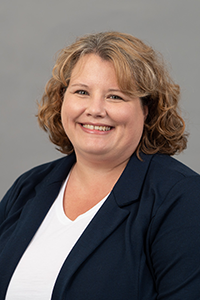RN-to-BSN Program
Program Highlights
|
|
|
|
|
| 100% Online | 7 week courses | Flexible Admissions |
Potentially finish in |
How to Apply to the RN to BSN Program
The Loewenberg College of Nursing offers a flexible, accessible, and affordable online
RN-to-BSN Program via UofM Global. Nursing faculty are committed to providing high
quality, individualized, and learner-centered education for existing registered nurses
who possess an Associate Degree in Nursing. The online RN-to-BSN program is accredited
through the Commission on Collegiate Nursing Education, the Tennessee Board of Nursing,
and the Southern Association of Colleges and Schools. Printable RN-BSN degree sheet with sample curriculum (pdf)
30 Credit hours
|
SEMESTER 1 |
SEMESTER 2 |
|
NURS 3007: Professional Nursing RN-BSN |
NURS 3401: Clinical Pathophysiology RN-BSN |
|
SEMESTER 3 |
SEMESTER 4 |
|
NURS 4126: Community Health |
NURS 4207: Leadership for RNs |
For detailed information about the RN-BSN program, including policies, course names and descriptions, visit the Undergraduate Catalog.
- Provide safe, compassionate, inclusive, high-quality nursing care across the lifespan and continuum of healthcare settings.
- Use evidence-based research, informatics, and technologies in nursing practice to improve the health of diverse populations.
- Explore the impact of social determinants of health, legal factors, and political factors that shape healthcare delivery and professional nursing practice.
- Communicate and collaborate effectively as a leader and member of interprofessional teams to impact healthcare delivery.
- Implement clinical prevention and health promotion strategies to improve patient and population health outcomes.
- Integrate personal and professional values and ethical principles into the design and delivery of person-centered care.
- Demonstrate practices that foster personal health, resilience, well-being, and lifelong learning to support the acquisition of nursing expertise and leadership.
- Apply theory and research-based knowledge from nursing, the arts, humanities, and other sciences, while demonstrating clinical judgment aligned with the nursing process and founded on a broad knowledge base across different practice care settings.
- Communicate effectively and compassionately in the planning, delivery, and evaluation of high quality, person-centered care using evidence-based nursing practice across the lifespan and the four spheres of care.
- Integrate public health principles related to population management in collaboration with a broad range of individuals, populations, and stakeholders to develop and evaluate community-based activities across a continuum of practice care services using a socioecological framework.
- Demonstrate the ability to access and critically appraise evidence-based studies for application to practice with diverse populations within different healthcare practice settings.
- Apply quality improvement principles that incorporate best practices in care delivery, contribute to a culture of patient safety, and support the development of strategies/interventions designed to mitigate unsafe environments in diverse settings and within the four spheres of care
- Collaborate with interprofessional team members, patients, families, communities, and other stakeholders across the four spheres of care in a professional, accurate, and timely manner using established tools and techniques to improve health outcomes.
- Describe organizational principles as they relate to equitable healthcare delivery across the life span of diverse populations and different practice care settings and the relationship between the organization, external systems, and payers.
Applicants to online and hybrid nursing programs must be residents of a state in which the Loewenberg College of Nursing is authorized to provide distance education. The Loewenberg College of Nursing is NOT authorized to offer distance education in California. Students who reside outside of Tennessee and plan to enroll in an online program of study that leads to advanced nursing licensure are individually responsible for verifying that the program meets the requirements for advanced licensure in their state. Online nursing students should contact the state licensing body from which they will be seeking licensure to ensure eligibility requirements.
Students who relocate to California, where LCON is not authorized to offer distance education, will be required to fulfill their remaining course requirements in Tennessee or another authorized state or to withdraw from the program.
- National Council for State Authorization Reciprocity Agreements (http://nc-sara.org).
Cost-Saving Features
Credit by Examination (CBE)
The Loewenberg College of Nursing (LCON) appreciates the knowledge and skills that RN students bring to the BSN program and acquire through formal mentored residencies and internship programs. Accordingly, students may earn college credit for prior learning experience with approval. Course credit may be earned through a national standardized achievement exam and by a professional portfolio. Credit by examination (CBE) can be earned for three RN-BSN courses:
- Health Assessment & Lab (NURS 3109/10)
- Pathophysiology (NURS 3401)
- Pharmacology (NURS 3009)
Students will be awarded college level credit after admission to LCON by successfully passing a professionally recognized national exam at the national proficiency benchmark. CBE can be earned by a) achieving proficiency on a standardized achievement exam taken in the associate degree nursing (ADN) program and b) taking a national standardized exam at LCON.
For the most current information regarding tuition, visit the University & Student Business Services.
Additional fees, including clinical practicum fees, materials fees, testing fees, and insurance fees, will be required throughout the program. These fees are not included in the university fee schedule. Current fee rates can be found in the LCON Academic Bulletin.
Click here for more information on Tuition and Fees.
Please be advised that there are additional fees for the pre-licensure BSN program:
- A $40 per credit/audit hour fee is assessed for each nursing course. This applies to all junior, senior, graduate level courses including TN eCampus (formerly RODP).
Step 1: Complete the UofM Global application and select Transfer or Readmit for the application type.
Step 2: Select "Nursing RN-to-BSN" as your anticipated plan of study. List all colleges at which you have taken (or are taking) courses and earned college credit.
Step 3: Certify and submit an application.
Deadlines to Apply
RN to BSN admissions are processed on a continuing basis.
| Entry Semester | Application Opens | Application Deadline |
|---|---|---|
| Fall | Continuous | August 1 |
| Spring | Continuous | January 1 |
| Summer | Continuous | June 1 |
RN-to-BSN Admission Requirements
- An earned Associate Degree in Nursing or Diploma from an institution accredited through the Accreditation Commission for Education in Nursing (ACEN).
- Be admitted to the University of Memphis as a degree-seeking undergraduate student.
- Have an active, unencumbered RN license or be eligible for licensure.
- Complete the UofM Global application for the RN to BSN program.
- Minimum cumulative college GPA of 2.5.
- If transferring from another accredited nursing program, a letter of good academic standing from the Dean/Director of the previous nursing program is required.
- Prerequisite Courses:
- Anatomy and Physiology I w/Lab
- Anatomy and Physiology II w/Lab
- Microbiology w/Lab
- English Comp. I
- English Comp. II
- Intro to Sociology or General Psychology
- Nutrition
- Any of the following Maths can be taken as the pre-requisite:
- MATH 1420 - Foundations of Mathematics
- MATH 1530 - Prob/Statistics/Non Calculus*
- MATH 1710 - College Algebra
- MATH 1730 - Pre-Calculus
- MATH 1830 - Elementary Calculus
- MATH 1910 - Calculus I
- *MATH 1530 (Statistics) can satisfy the prerequisite and general education requirements. MATH 1530 will be required once admitted into the program if not already complete.
- If seven years have lapsed since credit was earned in BIOL 2010/BIOL 2011 and BIOL 2020/BIOL 2021 (Anatomy and Physiology), or BIOL 1230/BIOL 1231 (Microbiology), the content is considered outdated, and students are required to either repeat the course(s) or validate the currency of knowledge. Required validation of current science knowledge for RNs will occur through employer verification, repeating of course, and taking a higher-level science course in the same field.
- General Education Requirements
- In order to earn a BSN, students must complete the general education requirements for the University of Memphis. Many students are able to transfer most of the general education courses after completing an Associate’s Degree. However, the required credits may be completed within the four-year period.
|
|
|
|
|





